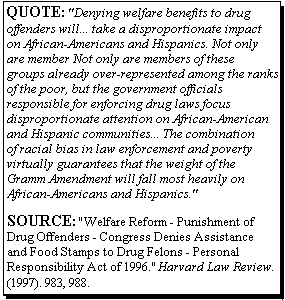
OBJECTIVE: ENCOURAGE “FAMILY VALUE-FRIENDLY” POLICIES AND FAMILY UNITY THROUGH TREATMENT AND SUPPORT SERVICES, NOT PUNITIVE RESPONSES
Rationale: According the U.S. Department of Health and Human Services, studies have found that 10-20 percent of welfare recipients have a substance abuse problem.
110 Experts acknowledge that substance abuse is widely under-reported.111The 1996 federal welfare reform law (Temporary Assistance to Needy Families - TANF) denies welfare benefits to women convicted of a drug felony since August, 1996 and give states broad authority to drug test women on welfare. Ironically, women on welfare receive their health care through state Medicaid programs that provide little or no coverage of drug treatment services. At the same time, women on welfare must meet strict work requirements and time limits. Many women will not achieve the transition from welfare to work until the welfare system provides access to drug abuse treatment.
The GAO estimates that substance abuse is a key factor in at least three quarters of the foster care cases in the U.S.
112 Women with alcohol and drug abuse problems should not be presumed to be unfit parents. Rather, public policy should help women keep their families together while accessing drug treatment. In fact, treatment outcome studies suggest that women who are allowed to have their children with them in residential programs are more successful than women who are separated from their children.113Recommendation 1: Repeal section 115 of the TANF and Food Stamps benefit programs, and reform welfare to help rather than penalize women struggling with drug abuse problems.
Congress should pass welfare reform that allows states to help women with felony records move toward healthy and productive lives through the TANF program. Currently, section 115 of the Welfare Reform Bill (also known as the Gramm Amendment) places a lifetime ban on TANF (Temporary Assistance for Needy Families) and Food Stamps benefits for convicted drug felons. Recently, the Justice Policy Institute issued an analysis
114 of the impact of this provision. It concluded that this provision will:

In essence, states should not be allowed to tie welfare benefits (cash assistance, Medicaid, food stamps, or other aid) to drug convictions or involuntary submission to drug screening. Rather, Congress should fund welfare-to-work programs that provide drug treatment and services to women.
Furthermore, congress should pass a specific exemption to TANF work and time requirements for women with drug abuse problems, similar to the one granted female victims of domestic violence.
Recommendation 2: Fund alcohol and drug abuse treatment programs that work with women and their children.
Maintaining family unity and social support networks are often key aspects of a person's recovery from addiction, and this “family value-friendly” factor should be at the forefront of substance abuse programs. This means treatment programs should be easily accessible, preferably located in the community. Child care services should be provided so women who are the primary care giver are able to attend treatment programs without having to find child care.
While a person with a substance abuse problem may be unfit to have custody of children, that is not always the case and should not be presumed. Programs like foster care and child protective services should work in concert with alcohol and drug abuse treatment programs to enable women to obtain treatment without losing custody of their children. Furthermore if separation is absolutely necessary, efforts should be made to reunite women with their children once treatment is complete.
110 Gerstein, D.R., Johnson, R.A., Larison, C.L., Harwood, H.J., and
Fountain, D. (1997). Alcohol and Drug Abuse Treatment for Parents and
Welfare Recipients: Outcomes, Benefits and Costs. Washington, D.C.: Office
of the Assistant Secretary for Planning and Evaluation, U.S. Department of
Health and Human Services.
111 Woodward, A., Epstein, J., Gfroerer, J., Melnick, D., Thoreson, R.,
and Willson, D. (1997 Spring). "The Drug Abuse Treatment Gap: Recent
Estimates." Health Care Financing Review. Vol. 18, No. 3. p.
6.
112 Drug Strategies. (1998).
113 Drug Strategies. (1998). citing DeLeon, Ed. 1997 - three relevant
articles
114 Rukaiyah Adams, David Onek, and Alissa Riker. (1998). Double
Jeopardy: An Assessment of the Felony Drug Provision of the Welfare Reform
Act. Washington, DC: Justice Policy Institute.
115 Ibid.
116 "Deny Aid to Those Who Need it?" (August 7, 1998). The Des Moines
Register. Pg. 8.
117 Legal Action Center. (1996). A Fact Sheet for Policy Makers -
Welfare Reform: Implementing Drug Felony Conviction Provisions. Washington,
DC: Legal Action Center.